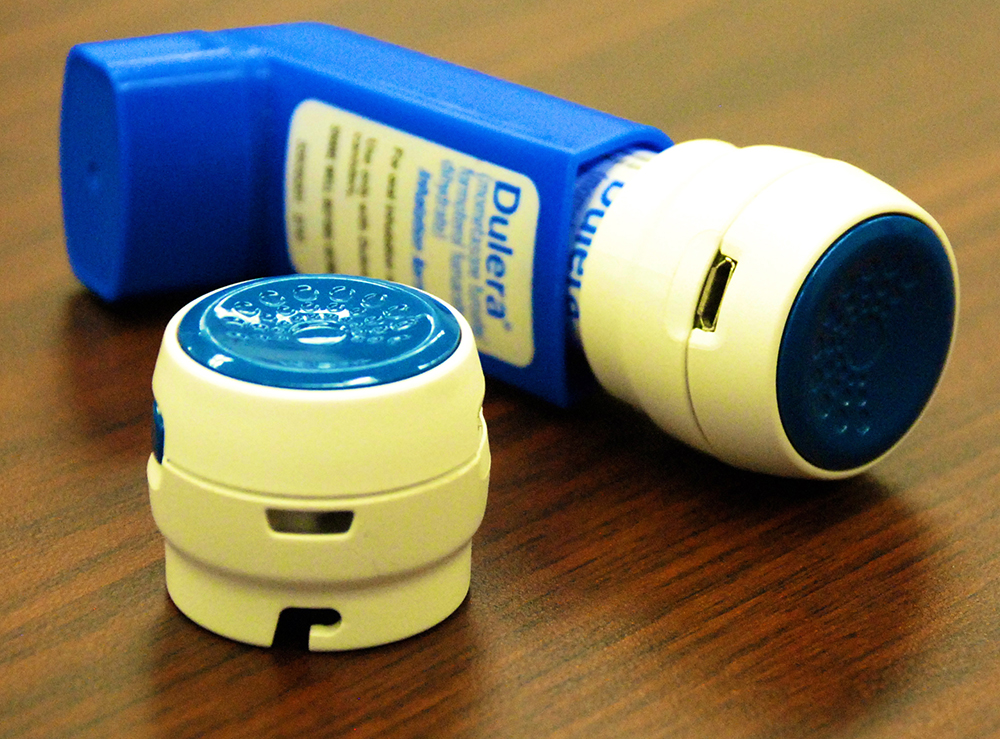
A sensor on this inhaler relays real-time data to a mobile app for iPhone and Android that tracks medication usage, including the time and place where the drug is administered.
WASHINGTON – The fledgling “wireless healthcare” industry is calling on Congress to promote technology that allows patients to collect and monitor their own health data on smartphones and other devices.
Wireless technology can mean anything from ingestible sensors to wireless glucose monitors that communicate with a Bluetooth-enabled device. While it may sound futuristic, many products have already passed inspection from the Food and Drug Administration and landed in the pockets of health-conscious American patients.
A San Diego-based non-profit advocate for medical technology, CONNECT, has written an “Innovation Agenda” for Congress. The memo asks for an incentivized tax code and a repeal of the medical device tax, among other things the industry group wants to spur growth in the sector.
Representatives from Qualcomm, Proteus Digital Health and a company called Asthmapolis also discussed the issues facing their medical technology products before a group of congressional staffers earlier this month.
Asthmapolis is a Wisconsin-based technology company with a “smart” inhaler for asthma sufferers. A sensor on the inhaler relays real-time data to a mobile app for iPhone and Android that tracks medication usage, including the time and place where the drug is administered, as a way to thoroughly monitor symptoms and prevent serious asthma attacks.
Proteus Digital Health aims to fight another medical issue – the 50 percent of American patients who take their prescriptions incorrectly.
“The doctor may have told you something that may have made sense back in the hospital, but that was a long time ago,” said Dr. George Savage, co-founder and chief medical officer of Proteus Digital Health.
Savage’s product is an ingestible sensor, about the size of a grain of sand, which is attached to the pills you swallow. A patch worn on the outside of the body then captures and transmits the body’s physiological responses. That information is sent to a Bluetooth-enabled device – like a smartphone or tablet – which displays the data in a way that it can be shared with a healthcare provider.
Doctors can determine if medications are being taken accurately and whether they are performing as they should – cutting out what could add up to billions of dollars in unnecessary or improperly administered medications.
While it sounds expensive, Savage says that the sensors can be produced for pennies.
That is, if Congress will help to pave the way. In a country with the world’s largest corporate tax rate, incentivizing the tax code to benefit these largely start-up companies is one of the industry’s priorities.
“The opportunity to create a pro-growth tax code that incentivizes and rewards innovation is indispensible,” said Timothy Tardibono, the vice president of public policy for CONNECT. He said earnings that are less heavily taxed will be able to “infuse capital” into budding innovation and evolving technologies.
Healthcare economist Devon Herrick of the National Center for Policy Analysis agrees that taxing capital is the worst thing to do a fledgling start-up. “The more you reduce the rewards through a tax – the less likely a tech start-up will be willing to take that risk,” he said. “Don’t tax the capital if you don’t want to discourage innovation.”
Specific taxes are also curbing progress, according to CONNECT. While the Affordable Health Care Act makes an effort to promote technologies that monitor health remotely, industry advocates say the act’s two-point-three percent excise tax is creating “incredible headwinds” for med-tech innovation. Approximately $388 million in medical device taxes were collected at the beginning of this year – funds that companies say they would rather invest in the research and development of their technology.
“It is especially hard on start-ups and emerging companies because it is a tax on all revenues, not just profit,” Tardibono said. “So as start-ups are growing and not yet profitable, they still have to pay the tax regardless.”
The tax was implemented as one of the main sources to help fund the Affordable Care Act. While high margin companies barely feel the tax in their bottom lines, Herrick says, many members of Congress are realizing that low-margin companies – like most medical technology start-ups – are disproportionately feeling the pain.
But not everyone agrees with Herrick and the industry’s agenda. Economist Paul Van de Water of the Center on Budget and Policy Priorities argues that the medical device tax could instead spur medical-device innovation by “promoting more cost-effective ways of delivering care.”
“Tax rate is just one of the many factors affecting financial incentives,” said Van de Water in a report released in March, who pointed to the fact that many device companies are able to sustain themselves by making small improvements to existing products.
The issue has sparked conversation on Capitol Hill. The Senate voted 79-20 to repeal the tax back in March, but the vote was taken as part of the budget resolution. The measures needed to fully repeal the tax could still be more than a year away – if the issue ever makes it that far.
